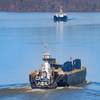S. Korea's Daebo Int. is 3rd Dry-Bulk Shipper to File for Bankruptcy This Month
A third dry cargo shipper has filed for bankruptcy this month following a collapse in freight rates to historic lows in what shippers call the worst market conditions since the 1980s.
South Korea's Daebo International Shipping Co Ltd filed a court receivership, a form of corporate bankruptcy, on Feb. 11, mainly due to poor dry bulk market conditions, a company official said on Monday. It is the third known bulk shipper bankruptcy this month.
Weaker demand from China and an oversupply of ships has led to the industry downturn, pushing the Baltic dry index - the industry benchmark for freight rates - to an all-time low this month. The index has slumped by nearly two-thirds in the past 15 months.
"The dry bulk market is in a really bad shape, which has hit us hard," the Daebo International official told Reuters by phone. He declined to be identified as he was not authorized to speak to media. "We did our best but we cannot help it."
He said the court ordered Daebo's assets to be frozen on Feb. 13.
Daebo International mainly provides panamax-sized dry bulk shipping services such as iron ore, coal, grains and steel products, according to its website.
South Korea is the latest major shipping country to be hit by a bankruptcy in the sector.
China's Winland Ocean Shipping Corp filed for Chapter 11 bankruptcy protection in the United States on Feb. 12, court documents show, also citing difficult market conditions.
In Denmark, privately owned Copenship filed for bankruptcy earlier in February after losses in the dry bulk market.
"The combination of lower steel demand in China and the huge volume of new tonnage coming on line is what is causing panic and making this the worst bulk market since the mid-1980s," Hsu Chih-chien, chairman of Hong Kong and Singapore-listed dry bulk shipper Courage Marine said this month.
China's imports tumbled 19.9 percent in January from a year earlier as its economy grows at its slowest rate in 24 years.
Dry-bulkers are not the only shippers in trouble. Over 10 percent of the global liquefied natural gas (LNG) tanker fleet is currently estimated to be idled after Asian LNG prices fell almost two-thirds since February 2014.
(By Meeyoung Cho and Henning Gloystein; Additional reporting by Jonathan Saul in LONDON; Editing by Richard Pullin)













